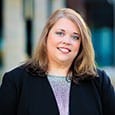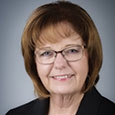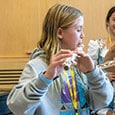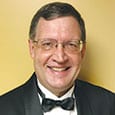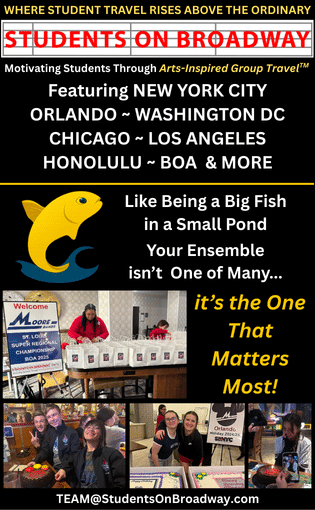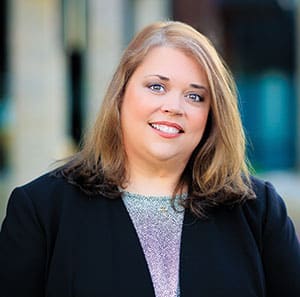 In her 18th year of teaching in Texas, Kim Shuttlesworth is Director of Bands and Fine Arts Department Chair for Coppell High School. Her ensembles have received recognition annually in marching and concert venues. Each ensemble has received superior ratings at the UIL Marching Contest, UIL Concert & Sightreading Contest, and the Texas State Solo and Ensemble Contest. Under her direction, her programs have been UIL State Marching Band Contest Finalists, Bands of America Regional, Super Regional, and Grand National Finalists, Shuttlesworrth’s concert bands have consistently received superior ratings. Her bands have advanced through the Texas Music Educators Association Honor Band Contest, placing 11th in 2019 for 4A with Tom Glenn High School and 6th place in 2023 for 6A with Coppell. Shuttlesworth has worked with summer programs over the past 20 years including the Music for All Summer Symposium, the Longhorn Music Camp, the Western Carolina University, and the Sewanee Summer Festival. She is an active adjudicator and clinician for marching and concert band.
In her 18th year of teaching in Texas, Kim Shuttlesworth is Director of Bands and Fine Arts Department Chair for Coppell High School. Her ensembles have received recognition annually in marching and concert venues. Each ensemble has received superior ratings at the UIL Marching Contest, UIL Concert & Sightreading Contest, and the Texas State Solo and Ensemble Contest. Under her direction, her programs have been UIL State Marching Band Contest Finalists, Bands of America Regional, Super Regional, and Grand National Finalists, Shuttlesworrth’s concert bands have consistently received superior ratings. Her bands have advanced through the Texas Music Educators Association Honor Band Contest, placing 11th in 2019 for 4A with Tom Glenn High School and 6th place in 2023 for 6A with Coppell. Shuttlesworth has worked with summer programs over the past 20 years including the Music for All Summer Symposium, the Longhorn Music Camp, the Western Carolina University, and the Sewanee Summer Festival. She is an active adjudicator and clinician for marching and concert band.
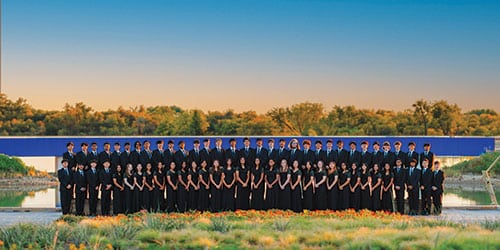
The news came late. On the day that Kim Shuttlesworth learned that her top band at Coppell High School in Texas had earned an invitation to the Midwest Clinic, she was out of town assessing other ensembles. Her phone kept buzzing with friends wondering if she had heard from Midwest. When she spotted a message from the Midwest in a spam folder, she raced into the hallway and learned the news. She celebrated with her students the next day. When they first recorded their submission to the Midwest, Shuttlesworth reminded students to focus on their musical journey and not the possibility of an invitation. She has prepared her Midwest program for the convention with a focus on the family and colleagues who helped to shape her music journey. “I thought about all those people that took a risk on a young kid from Carthage, Texas. As directors, we are not just ourselves. We are made up of all these different people that have helped influence us.”
How did you get started in music?
I grew up in a small town in East Texas called Carthage and lived there most of my life until college. My mom taught choir and band in a different small town and notified the Carthage band directors that I was going to play trumpet. (My parents gave me a trumpet mouthpiece when I was 10.) After I started band, my mom decided to give up teaching band and stick to choir. She took a job in the district where we lived because she wanted to watch me grow up and push me to be the best. I played trumpet all the way through and became a Texas All-State musician. My parents bet me that if I made All State, they would buy me whatever kind of trumpet I wanted. They never expected me to win the bet, but I rose to the challenge and received a custom-made Strad. I spent summers going to different band camps and fell even more in love with the trumpet.
I wanted to become a professional trumpet player and applied to the University of Texas. About halfway through school, I decided that I should not be a professional musician. Kevin Sedatole, who was then Associate Director of Bands and Director of the Longhorn Band advised me, “The way to be a great teacher is to be a great player.” His encouragement pushed me in the right direction. At the University of Texas, I was the third female drum major in their history and had a great time. Next, I student-taught in South Austin at Bailey Middle School with the great Diane Gorzycki, a director who really influenced my life.
Then, I student-taught at James Bowie High School where Bruce Dinkins was my mentor. I was very close to him, and he wanted to keep me around, so my first job was at Clint Small Middle School, a feeder to Bowie High School. A lot of very old knowledge influenced me early in my career and led me to be the teacher I am today. After my first year teaching middle school, Bruce moved me over to the high school to fill an opening. When he passed, I took over James Bowie for the next few years before moving on to a brand-new school to see what I was made of. When you open a new school, you learn if you can really teach or not, so I became the first band director at Glenn High School in Leander ISD.
Life took a turn when my mom was diagnosed with cancer in August 2020, and I decided to move closer to East Texas. By the grace of God, the Coppell job opened in October 2020; it was meant to be. I had six good months with her before she passed in February 2021. She always wanted to listen to my bands. I’d send her a video on Friday night and by Sunday she’d call with a laundry list of things I needed to correct. She was the eternal mentor and was a huge influence on my approach to teaching ear training and singing and also how to treat kids and bring a program together. I try every day to honor her and who she was.
Are you honoring your mother at the Midwest performance?
Yes, the concert pays tribute to so many mentors who have gone before me. We will be giving the premiere of a piece by Jack Wilds on the Midwest stage that was dedicated to Diane Gorzycki. We are also playing a transcription that Bruce Dinkins would have loved and a piece by Ryan George, and Bruce is the connection to that. I’m also honoring Scott Mason, who taught at Coppell for 30 years and made the program what it is.
My father is my biggest fan and requested that we play March Grandioso because that is his favorite, and my mother loved it when I had to opportunity to play it at the University of Texas. The entire concert is a thank you to my parents.
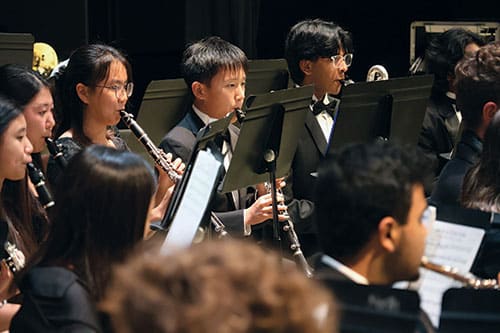
How would you describe the band program’s culture and relationship with the community?
The Coppell Band is rich in tradition, and the City of Coppell calls on us regularly to play for events. We are happy to perform, and the community supports us unconditionally. The same is true for my administration, who I can’t thank enough. They believe in the mission of what we do and understand that is it not just music-based, it is life-based. That support was a big draw for me when I decided to come to Coppell.
Although the surrounding Dallas-Fort Worth area has millions of people, there is a small town feeling in Coppell that reminds me of where I grew up. It makes me feel at home. I already knew what the program could do musically. I wanted to see how much we could contribute and accomplish as the next phase of that. We currently have 49 National Merit Semifinalists, the highest number of any school in Texas, and seven of those are band kids this year, as well as ten band students who achieved this honor last year. Our students are high-achieving and really appreciate their teachers, which I love. I am constantly learning from them, and they make me a better teacher.
That type of culture, where students drive the learning and not the teacher, means that students are constantly trying to get better. This is as true in working on their instruments as it is academically. They thrive when you give them challenging content and help make them better. I may say “If you’ve got time and you want me to hear you play, you can sign up for a slot” and the slots are filled in five minutes. They line up at the door waiting to play. I have never seen that hunger in my career, and it makes me work constantly to be the best version of myself. I don’t want to let them down.
When did you first think about applying to Midwest?
I first applied in 2012 and 2014 when I was at James Bowie High School and learned quite a bit from that process. When I started a music program at Glenn High School, I knew that performing at Midwest was a worthy long-term goal and wouldn’t happen right away. After coming to Coppell, I intended to apply in 2022 but when my mom passed on February 12, that was too close to the recording deadline. I was away from school for a couple of weeks handling the family situation. I told myself that I would not be scared to try again, even though my mom wasn’t around. I knew Midwest would be a great experience for my students. The worst that could happen is that they would say no. I told students that we would work towards this goal, and if it happens, it happens. I just wanted to see if we could get the music to a great level faster than we had before.
Many directors should be encouraged by knowing that it can take many attempts to get the invitation. Just because you have a phenomenal band coming up next year, that isn’t your only shot. You need to build consistency and have a wonderful band over several years. Some people think there is an exact equation to getting invited, that you need to play a particular march or include a transcription in the recording. In talking with my mentors, I learned that the submission just needs to be good and exciting. It needs to have life.
Sometimes people may say that Texas bands give cut and dried performances that are technically perfect but lacking emotion. I have never been like that. When I was a kid, my mom would sit next to me and sing my region etudes to me, particularly the lyrical etudes. She’d say, “You need to give it this flavor.” I have always approached my teaching the same way. I may never win Honor Band and that’s ok because I’m not going to be perfectly in the box or whatever people think that we are. I just want to make really good music.
What music did you include in the recording when you applied to the Midwest Clinic?
I did Hail to the Spirit of Liberty, a wonderful march with a lot of personality. It is not often played but it lets you take some interpretive risks that can really pay off. Then, I did a piece that I have only heard the U.S. Navy Band perform, The Wild Goose by Ryan George. It’s fantastic. It runs about nine minutes and is about a goose chase. This work allowed me to feature my wonderful oboe and English horn players and my really strong clarinet and flute sections.
At first the kids did not like The Wild Goose. They’re music snobs and wanted to know why we couldn’t do Pines of Rome or The Firebird. I told them we were doing it, and they eventually fell in love with it. It has compound meter and sounds different and modern. All of a sudden their performance was glorious. You could hear the story of the goose throughout the entire piece. I felt this music had imagery and storytelling that we would not get any other music this year. I paired it with Pines of Rome later for my UIL assessment, and these were two pieces you could watch in your mind.
How did you approach programming for Midwest with the requirement of playing music at all grade levels?
The best advice came from members of the Midwest Board. They told me that an audience at Midwest is not just Texas ears all the time. The concert doesn’t have to be a certain way. You just need to have a concert that is fun and enjoyable for the audience. I took that suggestion to heart and tried to make the concert more of a celebration than a display of technical skill. Our performance will feature new composers and also pay tribute to the people who helped get us there.
With this approach in mind, I wanted to anchor the concert with an exuberant fanfare-style piece. I kept changing my mind about what to put on the concert. I gave careful thought to the length of the concert and how people listen, and picked Howard Hanson’s Symphony #2 as the finale. It is an old-school, major transcription that is not played much anymore but has great passion and excitement. I changed to this piece on the day the program was due. It will be my tribute to Bruce Dinkins because he used to make me go to Sewanee Summer Music Festival, and I learned about transcriptions because he directed an orchestra at the festival.
One of my favorite pieces is our Grade 2 selection called A Dashing Gallop by James Pierpont and arranged by Patrick Roszell. It is written in an orchestral overture style and naturally gets faster as it progresses.
I am excited to take our students to hear the Chicago Symphony Brass perform. The concert we are performing will test our students a bit, but this is the deepest trumpet section I have ever had. You can take the first part and pass it down to the ninth chair and they will play it without fault. The Chicago Brass will motivate all of our students, particularly the sophomores and juniors who are younger and might think “I can do this.”
How has your teaching and approach to working with students changed over the past 18 years?
When you are young and in your first job, you are cautioned to make sure that students know you are the teacher and take you seriously. I was fortunate to work with Bruce Dinkins because he made me his partner in crime and not just his assistant. Because of some of the influences in my life, I thought that the job had to be so hard. Unless you arrived at 7 each morning and left at 8 at night, you weren’t doing your job well. I spent much of my early years thinking that if I worked longer and spent a lot of time at school, maybe all of this talent would just jump in my brain, and I would be able to do it. I worked hard but wasn’t as efficient as I probably could have been.
When Bruce passed, I was 27 or 28 years old, and they handed me a nationally recognized program. My goal was not to screw it up. I learned about resilience and that it is ok not to know something but you must be brave enough to ask questions. If you don’t learn the answers, it affects kids. It’s ok not to know the answer, but it’s not ok not to ask the question.
So, I constantly tried to find people to talk to and then remember and write down as much as possible. As I get older, I appreciate when someone who has been in the business a long time tries to give the advice you need. I find myself now trying to give that advice back because I know that younger directors may not listen now, but may appreciate it later.
I have also learned over time about relationships with kids and parents. I don’t always have to be right, and they don’t always have to be wrong. I have discovered how much people can learn from each other by listening and having mutual respect and understanding. All parents want is what’s best for their kids. Many adults have a role in helping children in their journey. My principal at Coppell says the number one thing she wants us to do is to love kids because many students don’t feel that in their lives or realize that there are people who are there for them. As teachers, our tool is music but our skill is life.
* * *
Bands at Coppell
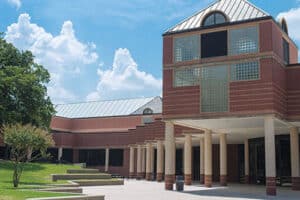
Coppell is a one-high school town with a building for grades 10-12, a 9th grade center, and three middle schools. The Coppell High School Band program has about 450 students and each middle school has about 250 music students. The high school has seven concert bands, two marching bands, a balanced percussion program, a color guard programmed with the marching band, and two winter guards. At the high school, there are three main directors plus a percussion director and a color guard director.
Shuttlesworth admits that the schedule is tight sometimes with two bands playing against each other in adjacent rehearsal rooms. She has tried to make the busy environment into a comical situation. “You can hear everything all the time. I will open the door to one room and say ‘your trumpets are flat’ and shut the door. Everyone laughs.” When the Wind Symphony was working on Pines of Rome, the band in the next room just stopped playing and listened because it was nearly impossible to get anything done.
The Coppell High School Wind Symphony performs at the Midwest Clinic on Friday, December 22 at 4:15pm.
